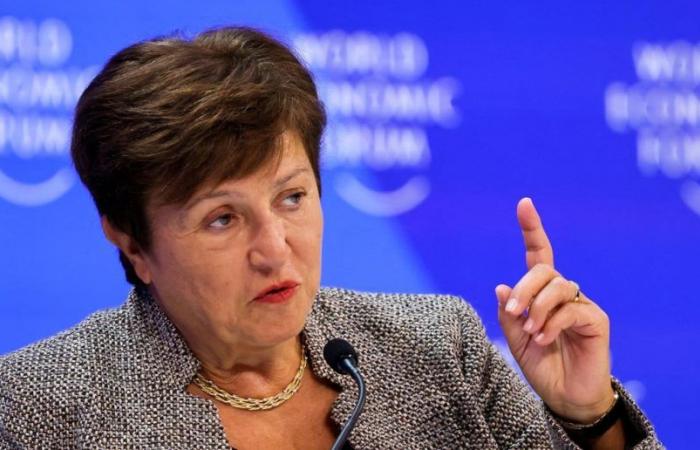“To sustain progress, it is necessary to improve the quality of fiscal adjustment, take initial steps towards an improved monetary and exchange policy framework, and implement reforms to unlock growth, formal employment, and investment,” the Monetary Fund said in recent hours. International, within the framework of the “staff report” in which the country predicts a decline of 3.5% of GDP, beyond the economic recovery of the improvement in salaries in the second semester.
The organization also released a letter of intent from the Argentine authorities for a new agreement that replaces the one signed by Mauricio Macri and Nicolás Dujovne 6 years ago, converted in 2020 by Alberto Fernández and Martín Guzmán into an Extended Facilities Agreement with repayment of capital from 2026.
The Minister of Economy, Luis Caputo, and the president of the Central Bank of the Argentine Republic, Santiago Bausili, presented a letter of intent to the IMF in which they propose reducing the primary surplus commitment from 2.1% to 1.7% of GDP. of the Argentine fiscal accounts, facing the two pending reviews of the current agreement with the organization (April-June and July-September), without altering the financial surplus commitment.
The economic team is confident that a lower burden of debt maturities in the immediate future would allow it to increase relative public spending without abandoning the purpose of balancing the accounts, including financial commitments. But the Argentine authorities also propose increasing the floating debt for expenses accrued for goods, services and works in the country; They suggested increasing it to $7.7 billion, compared to the current $2.9 billion, according to Bloomberg Línea. This is to partially compensate for the expected drop in economic activity of 3.5% of GDP.
Argentina proposed increasing net international reserves to US$8.7 billion by the end of September (US$1.1 billion more than the current commitment). According to the estimate of economist Salvador Vitelli, these reserves went from a red of approximately US$11,290 million at the end of the administration of former President Alberto Fernández, to US$950 million as of June 5, accounting for the 12-month Bopreales stock. A balance that narrows and even reverses if the term of that accounting is extended.
Without specifying deadlines, Caputo and Bausili requested to extend – as an exception – the capital controls and the Country Tax, despite the promise of lowering the latter from 17.5% to 10.5% expressed by Caputo, for a tax that Strictly speaking, it expires at the end of the year. The objective is “temporary” and “necessary” to manage the balance of payments.
“We wish to express our sincere gratitude for your continued support to Argentina under the current SAF agreement,” Caputo told the IMF board. He added: “We also hope to participate in due course in a possible new multi-year program supported by the IMF with the objective to continue addressing our deep-rooted challenges and build a more prosperous Argentina.
Javier Milei met with Kristalina Georgieva during his time in Italy; The Fund limited its expressions to the eighth review and the disbursement of just under US$800 million; Argentina, however, aspires to fresh funds to finance the exit from the stocks. The Casa Rosada promises general fiscal balance beyond 2024, for which it is analyzing a tax reform (neutral from an income perspective) and pension reform.
The government will send to Congress – according to the letter of Intent – a budget project for 2025 “consistent with the overall fiscal balance, with a breakdown of the policies underpinning the draft budget (where further structural measures will be needed) together with a comprehensive statement of fiscal risks to reinforce credibility”according to the IMF.
They also propose “a roadmap for additional fiscal reforms to improve the sustainability and equity of the retirement and pension system, and strengthen fiscal frameworks, as well as the intergovernmental transfer system by the end of 2024”.
“It is necessary to expand social assistance”with emphasis on measures such as the AUH and the Alimentar card – something that has been verified contrary to the intermediated assistance plans – in addition to maintaining adjustments for inflation of pensions until a new mobility formula is defined, says the IMF.
In 2025 to the markets?
Although there were no estimates on an exit deadline to get out of the stocks, the International Monetary Fund assured in a staff report after the Eighth review of the Extended Agreement, that the Government must “continue preparing the ground” for Argentina to return to the voluntary market. debt. The report states that correcting imbalances “will facilitate internal and external financing objectives.” It positively highlights “continuous progress in significantly reducing domestic refinancing risks, extending maturities, moving away from securities linked to inflation and the exchange rate, as well as reducing costly Central Bank insurance.”
“The IMF supports the authorities’ focus on rebuilding external buffers, as this is crucial to regain access to international financial markets by the end of 2025 (or sooner, if possible), with the aim of better managing obligations. (without increasing net debt)”, states the Fund’s text.





